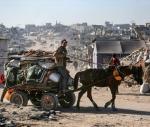You are here
Turkey’s social inclusiveness programmes
May 04,2016 - Last updated at May 04,2016
The seventh Alliance of Civilisations Summit, which took place in Baku, Azerbaijan, was a great success.
The Azeri leaders sent a very meaningful message of tolerance and coexistence to all those who try to portray Islam as an intolerant religion.
One of the focal topics of the summit was social inclusiveness. I had the privilege of being one of the speakers on the panel dealing with the issue.
In addition to hosting 2.7 million Syrian and 300,000 Iraqi guests, Turkey has implemented exemplary social inclusiveness policies during the last decade.
As I said during the summit, family has to be at the centre of all social policies. That is why Turkey established the Ministry of Family and Social Policies in 2011, which enables social support and programmes that are tailored so that families and those most in need of advocacy are the central focus.
Family courts, which provide the necessary regulations to solve family issues that fall within the scope of the judiciary, were established to provide legislative assistance.
New legislation was adopted to focus on the establishment and management of safe houses for women.
Violence prevention and monitoring centres opened in 14 provinces between 2012 and 2013. The number of safe houses for women rose from eight in 2012 to 95 by 2014.
Training and seminars raise awareness on the phenomenon of violence against women and teach how to prevent it.
For instance, every year, approximately 450,000 newly recruited officers and privates at the Ministry of National Defence will attend such training with EU funds.
Additionally, 17,000 religious figures have been trained on their role in preventing violence against women. The target is to reach 100,000.
In 2015, a 19 billion Turkish lira (approximately $7 billion) budget was allocated to the Ministry of Family and Social Policies because the concept of family first is the heart and foundation of our support network, which continues to provide assistance to those who require it most.
There is now access for pre-marital training programmes, which are becoming widespread.
An incapacity-to-work benefit has been introduced for 16 months in cases of pregnancy and maternity support, whilst a nursing benefit is now granted to insure self-employed women.
Financial assistance is granted to mothers in low-income families who have children aged 0 to 6 years to enable them to vaccinate them and see a doctor if needed.
In nursery schools, where previously one caretaker looked after 30 children, now there is one caretaker per seven children. Care homes for children increased 24-fold in comparison to the 2002 statistics, whilst the number of children placed in foster care has increased 39 times over the same year.
There has been a transition from the ward system to a home system, and from institution-based care to family-centred foster care in children’s services.
The number of children placed in foster care has almost doubled, as has child adoption, in the last 10 years.
Helping individuals with disabilities has also been at the fore; the first law pertaining to people with disabilities was passed in 2005.
Public places, such as roads, sports areas, schools and hospitals, have the obligation to enable people with disabilities to access them.
One hundred “accessible life centres” have also been set up, while the number of students requiring special education due to disability has risen fourfold since 2002. Recruitment of people with disabilities has increased sixfold since this same year.
In February 2014, a new law was enacted introducing new incentives for businesses to encourage participation of people with disabilities in the labour market, whilst the number of people getting disability salary has more than doubled, to 600,000 from 262,000, in 2002.
Salaries to people with disabilities who cannot find work or cannot work, or those over the age of 65, doubled and even tripled in some cases.
Benefits for relatives of martyrs and veterans have also been introduced.
Mobile phone companies reduced call tariffs for this category of people, and once a year, the government makes scholarship payments to the children of martyrs and veterans to help them cover their education expenses.
Assistance for social and economic support services increased almost seven times, while the amount of funds used for social aid and services increased 15-fold. Altogether, social expenditures have risen by 20 times since 2002.
These are definitely investments into the future of our citizens; not just a monetary investment, but also an investment into their well-being and their pursuit of happiness, and a determination to provide for our nation.
The writer is former EU minister and chief negotiator of Turkey. He
contributed this article to The Jordan Times.












